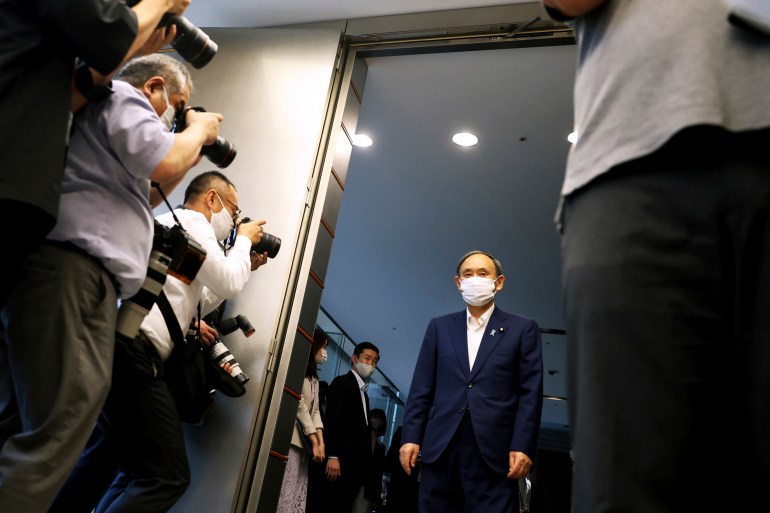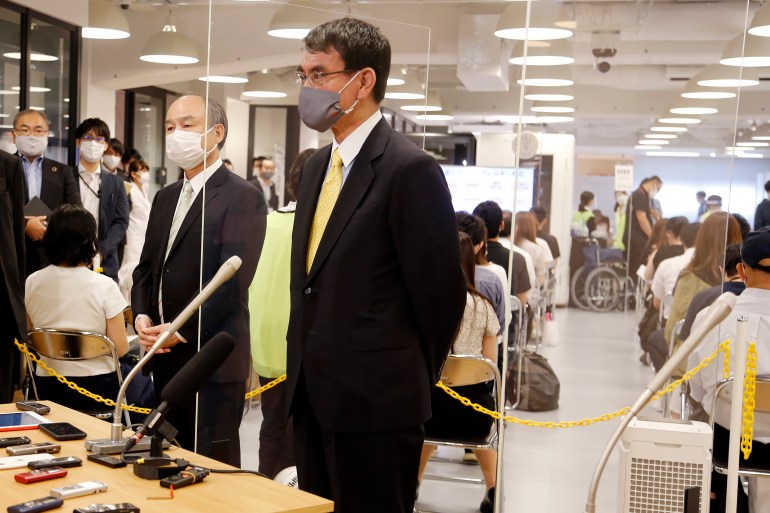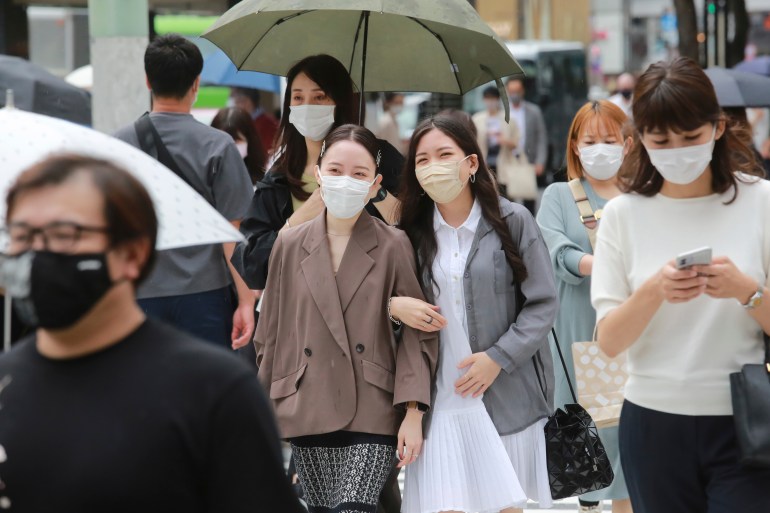Japan yearns for charisma as race to replace Suga heats up
Vaccine tsar Taro Kono is popular with the public, but might not get the support he needs from the ruling party’s local members.

Tokyo, Japan – The race to replace Japanese Prime Minister Yoshihide Suga is gathering momentum after the veteran politician chose not to run for re-election as president of the leading Liberal Democratic Party (LDP) when it holds elections at the end of the month.
The four main contenders include 58-year-old vaccine tsar Taro Kono, 64-year-old former defence minister Shigeru Ishiba, and former Foreign Minister Fumio Kishida, also 64. Sanae Takaichi, 60, a conservative nationalist with the support of former Prime Minister Shinzo Abe, announced her bid on Wednesday, becoming only the second woman after current Tokyo Governor Yuriko Koike to challenge for the role.
Keep reading
list of 4 itemsJapan suspends 1.63 million Moderna doses over contamination
Japan expands state of emergency as Delta variant cases soar
Japan’s defence, economy ministers visit Yasukuni shrine
A general election must be held by November 28.
Given the pronounced sense of malaise surrounding the LDP’s main rival, the Constitutional Democratic Party, it is likely that whoever replaces Suga will also go on to win the election.
For Lully Miura, head of the Yamaneko Research Institute, the election will probably be too soon for Sanae Takaichi. The former internal affairs minister “has only a small chance of winning the LDP presidential race. This is her first time running. She is also yet to show her quality as a leader, so she is unlikely to gather as many votes as Kono or Ishiba”.
A new generation of LDP Diet members, Miura believes, are likely to lean towards the younger of the main candidates, Taro Kono. “But what complicates the situation is the local party members’ votes, which constitute half of the first ballot. These may go to the better-known, stable candidate. So if Ishiba runs, he will certainly get a large number of votes.”
Whoever secures the party presidency will influence the direction of Japan’s foreign policy at a time of increasing tension with regional neighbours over territorial disputes and cybersecurity issues.
“Fumio Kishida is a dove in foreign policy terms,” Miura said, “whereas Ishiba is a comparative hawk. Kono also is hardly a dove, even aggressive in some historical issues related to the Republic of Korea. Takaichi is the most hawkish among them. She has promised to give Japan strike capability against China and the DPRK [North Korea].”

Suga’s departure follows a year of severe challenges.
The longtime lieutenant to predecessor Shinzo Abe took office a year ago. Since then, the coronavirus pandemic has surged, heaping pressure on a government determined to push ahead with the delayed 2020 Tokyo Olympics and Paralympics despite public opposition. The Paralympic Games came to a close on Sunday.
Many accused the prime minister of weakness in the face of pressure from the International Olympic Committee to host the event. His critics argued that his insistence on forging ahead as planned endangered public health.
After a troubled start to the vaccine rollout, just 32 percent of the country had received at least one shot of the coronavirus vaccine by the start of the Games.
While the event was held largely without spectators, and the Olympic bubble itself remained mostly incident-free, the Games coincided with an outbreak of the Delta variant in host city Tokyo and a huge rise in daily cases nationwide.
As political scientist Masamichi Ida points out, the Suga administration inherited many of these issues from Abe, who resigned on September 16 last year. “However, we should also acknowledge,” Ida added, “that it is during Suga’s term as leader that the public’s disregard for state of emergency measures – i.e. calls not to go out – has become a conspicuous trend.”
Low bar
Local election losses in Nagano, Hiroshima, and Hokkaido compounded Suga’s failure to tackle the pandemic. By August, his public approval rating stood at a low of 29 percent, below the 30 percent mark generally considered terminal for Japanese prime ministers.
When the LDP candidate lost last month’s mayoral election in Yokohama, Suga’s home turf, his position became untenable.
Even as the prime minister insisted that he would stay in the job to see out his work combatting the pandemic, party heavyweights forced his resignation, fearing embarrassment in the election ahead.


The LDP has retained power for all but three years since its formation in 1955. The last time the party lost an election in 2009, it quickly regained control from the now-disbanded Democratic Party of Japan. The resounding victory in the 2012 election handed Abe the mandate to pursue the long-held party target of constitutional reform and his Abenomics fiscal programme.
Ultimately, Suga failed to step out of his predecessor’s shadow.
He also suffered from a perceived inability to communicate with the public, particularly in relation to the pandemic.
“He’s a terrible communicator”, said Jeff Kingston, the director of Asian Studies at Temple University in Tokyo. “Testy and evasive in press conferences and wooden in Diet debate, like a robot on autopilot. A drone more than someone who can inspire.
“He was a formidable number two [to Abe] but disappointed as prime minister because he lacks leadership qualities. For someone who had a reputation for getting things done, he came up short and often seemed out of his depth.”
Suga’s failings could, however, pave a path to success for his replacement.
“Due to his poor performance and minimal achievements, Suga set the bar low for his potential successor,” Kingston said. “A good communicator is essential to offer a vision of hope and convince voters that the LDP can deliver on the promise of economic revival and a blueprint for emerging from the woes of the pandemic.”
Kono is currently leading the way, at least in terms of public polling.

The outspoken and social media savvy politician has won support for an immunisation programme that has catapulted Japan into a vaccination world leader – according to the latest data from Reuters COVID-19 tracker some 55.6 percent of the population has received both shots of the vaccine – and has managed to avoid much of the criticism levelled at Suga for the rollout’s early failures.
He is also considered something of a maverick by conservative LDP standards. Minister for administrative reform, his decision last year to go against a section of LDP legislators by cancelling the Aegis Ashore missile defence system marked him out as a decisive leader capable of making difficult policy decisions.
Elsewhere, former foreign minister Kishida indicated a willingness to promote change when he became the first candidate to publicly challenge Suga’s party leadership by throwing his hat into the ring in August.
Considered a liberal within the party, Kishida’s bid aims to capitalise on the discontent among younger LDP legislators over voter dissatisfaction with the outgoing administration. He has pledged to reduce the term length for LDP executives to three years to make room for more younger people in the party leadership structure.
Tough for women
As a generation of legislators retires, the party is going through a regenerative phase. Of the 276 LDP lower house members, almost half are less than 60, with the average age now 59.
Meanwhile, Ishiba – a perennial candidate for the leadership – has struggled for support within the party. The former defence minister’s outspokenness has made him a favourite with the public but left him with few friends in the party, which bristles at his past criticism of the Abe administration. He seemed to suggest on Tuesday that given the growing momentum for Kono, he would not run for the leadership.
Takaichi officially announced her own candidacy at a press conference on Wednesday afternoon in Tokyo. Having secured Abe’s backing over the weekend, Japanese media reported she had also confirmed support from the 20 LDP legislators necessary to make a bid.
The need to secure backing is often seen as a stumbling block for female candidates in the male-dominated LDP, where men account for 92 percent of LDP Diet members. Should Takaichi’s leadership bid succeed, she would become the first female prime minister in the nation’s history.
Although that would be a big step forward for women in a country that continues to struggle with globally low levels of gender equality, Takaichi’s staunch conservative politics may disappoint those hoping for immediate gains in levelling the playing field for women.
In the past, for example, she has opposed the right for women to use their own surname after marriage and has also visited Tokyo’s Yasukuni Shrine, a controversial site where convicted war criminals are among those remembered.

“Unlike the Republican party in the US,” said Yamaneko’s Research Institute’s Miura, “Japanese social conservatives are not trying to change the status quo. Rather, they are trying to keep it.”
“Takaichi, if elected, will make a path for other women to become a leader. However, because she has to persuade people that she is a ‘real conservative’, Japanese society will not go through socially radical change during her term.”
After a year of unprecedented challenges in which the administration appeared to lurch haphazardly from one misstep to the next, much of the public need for change may be sated simply by a change of face at the top.
For Temple University’s Jeff Kingston, “Kono seems the best candidate to hit the reset button, arouse party members and reach out to unaffiliated voters.”
Whoever the LDP chooses, voters will soon have their say, and the party will be hoping the new leader will be able to quell the public mood of dissatisfaction and stay in the job for more than the year that Suga managed.